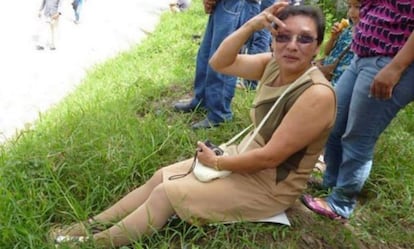Another environmentalist killed in Honduras in wake of Berta Cáceres murder
Some 114 environmentalists have been killed in Central American country over the last decade


Honduras is a killing field for environmentalists. Four months after the murder of environmentalist leader Berta Cáceres, her colleague and fellow activist Lesbia Yaneth Urquía was kidnapped and killed.
Her body was found in Mata Mula near the Marcala garbage dump, 100 kilometers from Tegucigalpa. Preliminary official reports say the 49-year-old mother of three died of a machete wound to the skull.
Urquía’s death is the latest in a long list of murders. According to Global Witness, 114 environmentalists have been killed in Honduras in a little more than a decade. Most of those cases went unpunished and those that were prosecuted delivered terrible results.
The perpetrator of Urquía’s murder remains a mystery. She was abducted while out for a bike ride the day before her body was found
The tireless environmentalist and Goldman Environmental Prize (the “green” Nobel Prize) winner Berta Cáceres died on March 2 of two gunshot wounds. She was attacked outside her home in La Esperanza. A company named DESA came under immediate suspicion because Cáceres and her organization, Civic Council of Popular and Indigenous Organizations of Honduras (COPINH), were fighting against its Agua Zarca hydropower project, which the group said was drying up Gualcarque River, a sacred site for the indigenous people of the region.
An eyewitness and international pressure helped push the investigation forward. The DESA manager, security chief, a Honduran army major and two hitmen were arrested in May.
Meanwhile, the perpetrator of Urquía’s murder remains a mystery. She was abducted while out for a bike ride the day before her body was found. Urquía also opposed hydroelectric dams in Honduras, including a project linked to Gladys Aurora López, vice-president of Congress and president of the National Party.
COPINH has blamed the Honduran government, López and her husband for Urquía’s death. “They are a constant source of threats and conflicts over hydroelectric projects in the department of La Paz,” the group said in a statement.
Sign up for our newsletter
This newspaper has not been able to reach López for comment.
According to Reuters, police sources say Urquía, who owned two hotels and a small shop, may have been killed because of a family dispute or extortion. Her colleagues reject those theories, saying that the police also tried to paint Cáceres’ death as a random criminal act.
In a country where 90 percent of crimes remain unsolved, even though another environmentalist has been assassinated, authorities have yet to arrest any suspects.
English version by Dyane Jean François.
Tu suscripción se está usando en otro dispositivo
¿Quieres añadir otro usuario a tu suscripción?
Si continúas leyendo en este dispositivo, no se podrá leer en el otro.
FlechaTu suscripción se está usando en otro dispositivo y solo puedes acceder a EL PAÍS desde un dispositivo a la vez.
Si quieres compartir tu cuenta, cambia tu suscripción a la modalidad Premium, así podrás añadir otro usuario. Cada uno accederá con su propia cuenta de email, lo que os permitirá personalizar vuestra experiencia en EL PAÍS.
¿Tienes una suscripción de empresa? Accede aquí para contratar más cuentas.
En el caso de no saber quién está usando tu cuenta, te recomendamos cambiar tu contraseña aquí.
Si decides continuar compartiendo tu cuenta, este mensaje se mostrará en tu dispositivo y en el de la otra persona que está usando tu cuenta de forma indefinida, afectando a tu experiencia de lectura. Puedes consultar aquí los términos y condiciones de la suscripción digital.








































